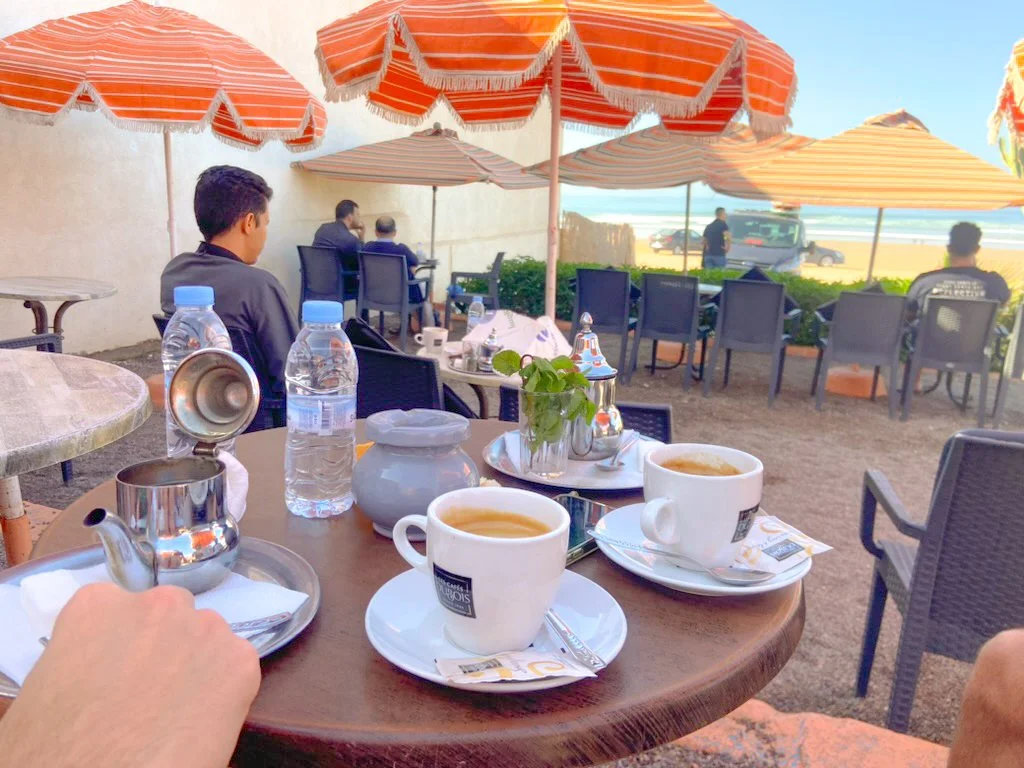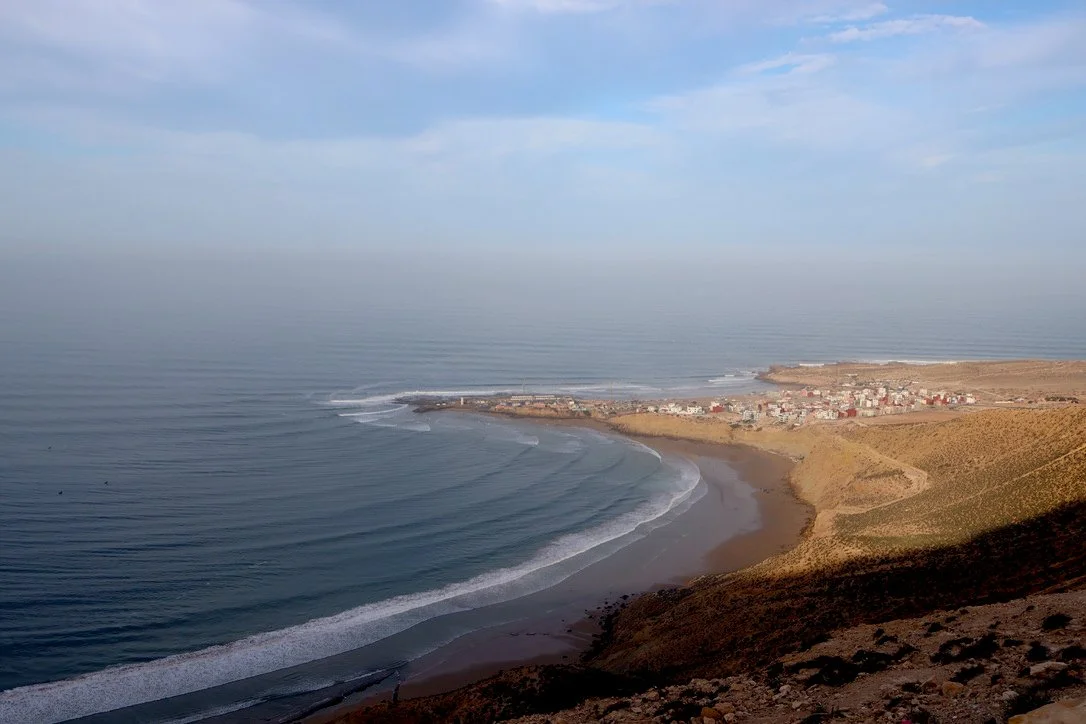Morocco Surf Camp
November 2023
Are you traveling or on vacation? Throughout my time in Europe, when meeting other travelers, I noticed that this was a common question that was asked as part of the introduction, especially when you stayed at a hostel. What is your name, where are you from, where are you coming from, and are you traveling or on vacation?
In Morocco, I was Katie, from the United States, coming from the Canary Islands. I was the only guest at this all-inclusive surf camp that was “that was traveling.” All the guests that I met were on vacation, taking a break from their jobs as data scientists, UX designers, traders, and engineers. And after the 1 week, 2 weeks, or however long they were spending at the camp, they would go back home and press resume on their lives.
Already surprised to be meeting an American all the way in Tamraught, Morocco, the other guests were more surprised, confused even, when I said I was from Southern California. What was I doing at a surf camp so far from home, when I lived close to some of the most well-known and idyllic surf spots in the world?
As ridiculous as it sounds, I was here to take a vacation from my travels. After spending the past month picking up after guests, and before I pressed resume on my life of hostel hopping, I decided to treat myself. I was not going to cook, clean, plan, or kiss up to guests. For the week, I was going to wake up, eat, surf, sleep, and repeat. The only plan for Morocco was to surf my brains out.
My experience surfing on Gran Canaria, the tiny island in the middle of the Atlantic Ocean, was humbling. The conditions at the local break from my hostel were rough. The current was usually too strong for me to paddle out to the lineup, and the choppy, messy waves were often be too big for my level. My preferred wave height is 1-1.5 meters (3-5 feet), but the waves were often 3-4 meters(10-13 feet). I was also just getting familiar with the this beach break, and had difficulty reading, catching, and riding the waves for a satisfying amount of time.
Morocco had never entered my mind as a potential place to visit until I arrived on the Canary Islands. My only knowledge of Morocco was from watching videos on Youtube of cool surf camps and places in the world to surf.
So many of the other travelers I met on the Canary Islands casually talked about Morocco. They had already visited or were planning to stop on their way back to mainland Europe. My interest piqued when a fellow hostel volunteer told me he bought his one way plane ticket from Gran Canaria to Marrakesh for 17 euros.
Even though it was in a different continent, the ease at which the European travelers talked about visiting Morocco reminded me of Americans visiting Mexico. Morocco was cheap, close by, and a completely different culture with apparently amazing food. Like Mexico, Morocco was also home to great surfing.
It was ultimately the still warm and sandal friendly weather that convinced me to choose Morocco over Portugal for a surf camp. I decided that I was not yet ready to face the rest of Europe’s coat and scarves weather. And I figured that if I was already in this part of the world, a less than two hour flight away, I might as well visit. When was the next time I was going to be so close to and have the chance visit Africa?
My time getting to know the waves and culture of this Arab country did not disappoint. The first person that I interacted with in Morocco was the taxi driver that picked me up from Agadir airport, as organized by the surf camp. He was a welcoming old man with a friendly, crooked teeth smile and a bushy mustache. Speaking in his broken but still understandable self-taught English, he pointed out fishing ports, banana markets, and the historical Agadir fort that could be reached by cable car. I learned about his 3 kids: his recently married 17 year old daughter, and his unmarried 26 and 24 year old sons who were both in university. In his opinion, all tourists were good for Morocco, but I still wondered what he thought about the way that I was living my life as a 25 year old single female solo traveler.
In every city I visited, for my own precautionary measures, I always assessed the female to male ratio of a given place. I noticed during that first taxi ride how few females there were walking, biking, or driving on the streets. From my seat as a passenger in the taxi, I observed the ratio to be about 10 to 1. When our camp separated into groups by level, I was the only female in my group. And during the time that I stayed at the camp, I was the only female guest who arrived solo. Except for the two sisters from the UK, the only other females guests I met were part of the French yoga group that was staying as part of a separate yoga retreat. I learned from the surf camp’s yoga instructor, a Scottish professional dancer who was there for the winter season, that there were rarely female guests who came solo. She was one of the two females on the staff team.
It was initially unnerving to readjust back into the role of being a guest. When I first arrived at the surf camp, I felt out of control now that I no longer knew all details of the facility that I was sleeping in. I did not know where all the beach towels were kept, whether I was allowed to use the laundry machine, or if the person I said hello to was a guest or part of the staff.
Thankfully, I quickly got along with and befriended the guests and staff. They helped distract me from the fact that I greatly missed my friends from the Canary Islands. We all shared the same passion for surfing and always had surfing to talk about. We became like a small family for the week spending all day surfing and eating three meals a day together. I also found comfort in conversing with the French speaking guests. Hearing their accents made me feel like I was with Lola and Ophelie again. I would smile inside, reminded of and grateful for the precious memories and friendships I had made during my travels.
Each morning, I sauntered downstairs to meet the other guests in the common area so that we could fuel ourselves for the day’s surf. A typical breakfast was fried eggs, smoothie, baskets of fruits and bread, and a pancake served with an assortment of different jams and honeys.
I relished in this vacation mode that I was in, hopping into a car that was already loaded. There was no need to worry about packing the wax, wetsuit, towels, sunscreen, changing towel, and all the other surf equipment that I packed my car with whenever I surfed at home in California.
Our instructors would then drive us in the packed sprinter van to a look-out point, in order to assess the waves and determine if the surf conditions were ideal for our group’s level. If the conditions were not ideal, our instructor would take us to another famous local spot that was never more than 20 minutes away. The drives up and down the Moroccan coast to each of the surf spots reminded me of driving on PCH (Pacific Coast Highway), along the central Californian coastline. The endless expanse of the Atlantic Ocean could be seen on one side of the highway, and instead of the fancy houses, California poppies, and dry brush that lined the other side of the highway in California, it was the African desert that lay on the other side.
For lunch, the camp would pack us sandwiches and fruits that we ate at the beach after our first surf session. And for dinner, delightfully exhausted from an entire day of surfing under the scorching Moroccan sun, we ate a three-course, traditionally cooked, family style Moroccan meal.
While I sat in the lineup, I observed the groups of beginner surfers receiving lessons in French or English. A handful of really skilled surfers, all locals who greeted each other and the local instructors in Arabic, still took most of the waves as they were at the top of the pecking order.
No matter where in the world that I was, the “surfer dude” look remained universal in every surf community I visited. They had shoulder-length sun-bleached hair, dark leathered skin, and were decked out in gear from major surf brands like Billabong or Ripcurl.
I had a few surreal surf sessions. The conditions were glassy and I caught some of the longest and most satisfying rides of my life. When I stared at the horizon and watched for waves, I would occasionally turn around to admire the beautiful, vast expanse of sand and desert rock formations. I would be pinching myself inside, in disbelief that I was actually here, surfing in Morocco.
There were of course still countless moments in which the ocean reminded me of her merciless nature and my own feeble existence. I had sessions when I was not able to paddle out to the lineup, and when I depended on the guidance of the my surf instructor to navigate the waves. But now having surfed for about 3 years, I was never as distraught as how I used to be during the first year that I learned how to surf. I understood that my progression of my surfing skills was not linear. And I was more accustomed to the humblings lessons that surfing still and would forever have for me.
Everyone that I interacted with at the surf camp seemed to be grounded in who they were. They all either had their careers or at least had a greater of a sense of what they were striving for. Some people were more shy or talkative, but I believe that this sense of purpose or stability made them easier to get along with.
When working at the hostel on the Canary Islands, I had my first interaction with the seasoned and long-time drifters, people whose lives really swayed in the direction that the wind blew. They were not in just a temporary phase of traveling. I was meeting these folks in the midst of their day-to-day, hostel-hopping lives, that they had been living for years, maybe even decades. I used to wonder about and appreciate these folks for their willingness to go against conventional societal expectations, but soon saw the ones without ties, as cautionary tales. I ended up finding them more difficult get along with as they had their own styles of communicating. It was as if they were too liberated in their way of navigating the world, but still carried the same stubbornness that slowly infected every human being as a result of aging.
The contrast in people that I met at the camp in comparison to the drifters reminded me of how important it was for me to choose something, and know how I wanted to identify myself. Momentarily, it was okay for me to explore, but I realized that what was important for me was to always have something to be working towards and find my community.





